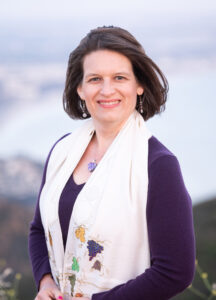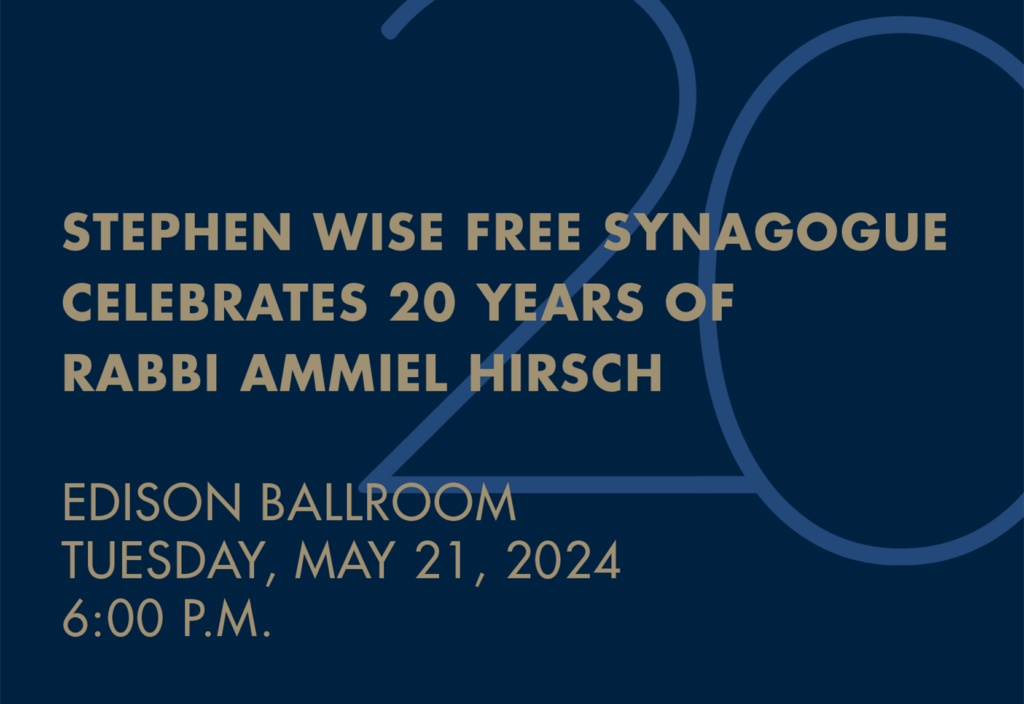Rabbi Dalia Samansky
Rabbi Dalia Samansky came to Stephen Wise from Temple Ahavat Shalom in Northridge, California, where she ran the religious school and youth programming for four years, and Los Angeles’ Melton School of Adult Jewish Learning, where she was a member of the faculty for 13 years. She was ordained by Hebrew Union College-Jewish Institute of Religion in 2009.

Recent Sermon
Finding the Right Balance
“This week, we were treated to a master class in leadership,” says Rabbi Dalia Samansky. When tasked with anointing a new leader, Moses did not cling to his role or pass it on to his sons. Instead, he set out to ensure the right leader was chosen, throwing his full support behind Joshua. “Leadership is about finding the right balance — knowing when to hold your ground and when to compromise.”
Sermons
Finding the Right Balance
July 26, 2024
“This week, we were treated to a master class in leadership,” says Rabbi Dalia Samansky. When tasked with anointing a new leader, Moses did not cling to his role or pass it on to his sons. Instead, he set out to ensure the right leader was chosen, throwing his full support behind Joshua. “Leadership is about finding the right balance — knowing when to hold your ground and when to compromise.”
Taking Responsibility; Passing Leadership
July 12, 2024
We often hear Pirkei Avot quoted: “You are not obligated to complete the task, but neither are you free to abandon it,” says Rabbi Dalia Samansky. While generally used in social justice circles, this quote also reminds us that “ultimately, leadership must be passed on to each new generation — willingly or unwillingly.” Over the course of this week’s parashah, “both Miriam and Aaron die, and Moses finds out that he will not be the one who leads his people into the Promised Land, thus beginning the passing of leadership to the next generation of Israelites.”
A Leap of Faith
June 28, 2024
Having been enslaved for so long, the Israelites doubted their ability to enter the Promised Land. Rabbi Dalia Samansky explains that “faith is believing without proof,” something the older generation of slaves struggled with. In a world where God’s presence isn’t as obvious, how do we develop faith?
A Growth Mindset
June 21, 2024
As the weather heats up, we read about our ancestors’ 40 years of walking and complaining in the desert. Rabbi Dalia Samansky explains that the slave generation’s inability to believe in change kept them from entering the Promised Land, while the new generation’s growth mindset allowed them to succeed: “Just as God let us learn from our mistakes, we must allow our children, students and ourselves to make mistakes and discover the solutions to our problems.”
Humanity in the Pause
May 24, 2024
“How often have we reacted instinctively and immediately regretted it?” asks Rabbi Dalia Samansky. Recognizing our weaknesses, the Torah prescribes rest periods and mitzvot to encourage us to pause and reflect. “When we take that extra moment to choose our actions and words, we reach our highest potential.”
Mistakes and Redemption
March 8, 2024
“We as a community royally screwed up” when we built the golden calf, says Rabbi Dalia Samansky. “But it is what happens in this week’s portion that shows how we as a people grew from our experience. Mistakes and bad decisions happen. It’s how we respond, learn and grow after them that reveals our true character.”
Silver Linings
December 29, 2023
On this last Shabbat of 2023, we read about how Joseph came to terms with the treachery of his brothers. “Sometimes our negative experiences help prepare or propel us,” says Rabbi Dalia Samansky. And while “not every negative experience in our life leads to something better, being open to the possibility of growth from our struggles is to believe in hope.”
The Rally For Israel
November 22, 2023
Rabbi Dalia Samansky reflects on how rallying for Israel in Washington helped to “heal our heartbreak, lessen our loneliness, and diffuse our desolation…” She says, “Standing on the national mall in a sea of white and blue, with Israeli flags proudly waving, and chants of ‘Am Yisrael chai,’ one couldn’t help but to feel hopeful for the future of the Jewish people.”
Focusing on the Blessings
September 22, 2023
When Rabbi Dalia Samansky’s uncle died, her grandmother said, “God has been good to me. He gave me an extra 40 years with Marty.” “I was in awe of her ability to recognize and articulate her gratitude amidst her grief,” she says. “‘When you open yourself up to experience gratitude, you discover with clarity and accuracy how much good there is in your life…’”
The Danger of Silence
September 1, 2023
As we prepare for the High Holy Days, Rabbi Dalia Samansky recalls powerful moments in our history when silence and inaction had grave consequences. “Sometimes, our greatest failings are not in the actions we take, but those we fail to take, she says. “Judaism is a religion of action. Let us heed the sacred call and take action to create the change we want to see in the world.”
If A Tree Falls…
August 18, 2023
“If a tree falls in the forest, does it make a sound?” asks Rabbi Dalia Samansky. As we approach the High Holy Days, “we are held to account for all of our actions, seen or hidden.” During the month of Elul, we reflect and introspect — to make amends and become better versions of ourselves. Follow our Elul Values Exploration to engage in this practice: swfs.org/elul.
Actions Speak Louder…
August 4, 2023
“What do you consider to be a ‘good’ Jew or a ‘bad’ Jew?” asks Rabbi Dalia Samansky. “To be a ‘good’ Jew, we must live our Judaism in our actions, not just our thoughts. As we approach the month of Elul — the traditional time for introspection and reflection — let us work to make our actions reflect the prayers of our hearts.”
Remembering the Good and the Bad
July 21, 2023
As the Israelites near the Promised Land, Moses recalls their journey — including their many failures. Amazingly, Moses and the Israelite People take responsibility for their actions, recognizing that mistakes were made and growth was experienced. “Having the ability to take responsibility and grow from our actions is a sign of emotional intelligence,” says Rabbi Dalia Samansky.
Arguing for the Sake of Heaven
June 23, 2023
Arguments “l’shem shemayim” — for the sake of heaven — are a battle for truth, not victory. In this week’s parashah, Korach was punished by God not for challenging Moses’ and Aaron’s leadership, but for trying to tear them down rather than improve the situation, says Rabbi Dalia Samansky.
The Power of Positive Perception
June 16, 2023
Rabbi Dalia Samansky reminds us that our mindset can have tremendous influence on our experiences. In this week’s parashah, the Israelites succumb to their fear of failure over their faith after 10 of their 12 spies report that taking the Promised Land would be a lost cause. “How different might our story have been, if only we hadn’t had such a negative outlook…”
Blaming Others For Our Own Faults
May 26, 2023
“Too often the faults we see in others are simply a reflection of faults we are trying to hide in ourselves,” says Rabbi Dalia Samansky as she describes an antiquated practice found in this week’s parashah. “How have we projected our biggest fears about our own lives onto those that we love? And how do we recognize and then alter our behavior?”
Counting and Being Accountable
May 19, 2023
We may ask ourselves why B’midbar, the Book of Numbers, begins and ends with a census of the wandering Israelites in the desert. “What importance is a simple list of tribes and numbers?” asks Rabbi Dalia Samansky. “When a census is taken we are reminded that yes, each and every one of us counts. But the commentaries go further with this and talk about our responsibility to be accountable, not just counted,” she says.
Rushing Through Life
April 7, 2023
Rabbi Dalia Samansky confesses “I hate matzah.” She does, however, appreciate the symbolism of the bread of affliction: “The whole process of making matzah must be completed in under 18 minutes — its hastiness results in its tastelessness.” But we should be careful not to rush through life, she says, lest each moment be as tasteless as matzah.
Making a Habit of Being Better
March 28, 2023
Have you ever questioned a tradition only to find out that no one knows where it came from? “One of the unique aspects of Judaism is that it is a religion that is far more interested in what we do than what we believe,” says Rabbi Dalia Samansky. “By habituating ourselves to acting like the people we aspire to be, we are able to actually become those better versions of ourselves.”
Finding Our Light Within
January 27, 2023
The darkness that descended upon Egypt “was no ordinary darkness, created by the absence of light,” says Rabbi Dalia Samansky. “Meanwhile the Israelites had light.” Where did it come from?
Memories Should Make Us Better, Not Bitter
December 30, 2022
“We are a people of memory. But our tradition also recognizes that it is neither possible nor healthy to remember everything,” says Rabbi Dalia Samansky, recalling her years as a hospice chaplain. “I often remind people that they are in charge of what they remember — for the purpose of memory is to make us better, not bitter.”
Generations of Imperfection
November 25, 2022
Rabbi Dalia Samansky loves Thanksgiving. But family gatherings can often be fraught. “As much as we’d all love to have a big happy family that gets along, this is not always the case,” she says. The Bible, too, is full of dysfunctional families and imperfect people. Perhaps “we don’t have to be perfect to be loved.”
Balancing Our Souls
September 23, 2022
Was the world created for us or are we but dust and ashes? “Depending on the situation, we should contemplate one or the other to remind ourselves of our place in the world,” says Rabbi Dalia Samansky. “Judaism believes that life is about balance…”
On Strong Shoulders
September 9, 2022
Here, “we stand by one another and we hold each other up,” says Rabbi Dalia Samansky as she’s officially welcomed to Stephen Wise. “Not only am I in awe as I stand before this congregation and God, but I stand firm and strong because I am standing on the shoulders of so many who came before me. This is an honor and a privilege.”
Redefining God
August 19, 2022
When people come to Rabbi Dalia Samansky to express their disbelief in the Divine, she says: “Tell me about the God you don’t believe in.” More often than not, they’re imagining a God who “resembles Zeus or Santa Claus,” she explains. “But the Bible has many descriptions of God…”
This Too Shall Pass
July 29, 2022
“Gam zeh ya’avor’ — ‘This too shall pass’ has a far deeper meaning than the short sentence implies,” says Rabbi Dalia Samansky. This week Moses reminds the Israelites of the 42 steps of their journey. “Moses wants to be sure that we remember that the journey to freedom, like our lives, are filled with the highest of highs and the lowest of lows.”
A Tradition of Change
July 22, 2022
“I am a proud Reform Jew,” declares Rabbi Dalia Samansky. “One aspect I particularly love about Reform Judaism is its ability to make Judaism relevant for today’s time.” We see this flexibility in this week’s Torah portion: “Not only does God grant their immediate request, but God even changes the rules going forward.”


